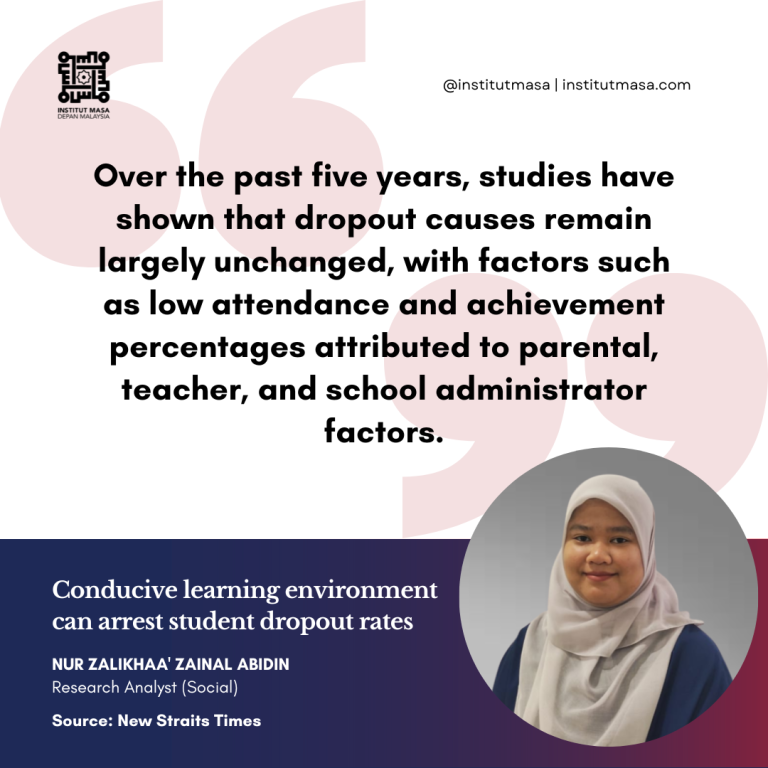Oleh Nur Zalikhaa’ Zainal Abidin
In the realm of education, Malaysia is facing a pressing concern where its students are falling behind on a global scale, scoring below the Organisation For Economic Co-operation and Development (OECD) average in mathematics, reading and science.
Despite efforts to address this issue, dropout rates persist, highlighting a need for comprehensive intervention.
The gravity of the dropout issue is underscored by data from the Examinations Board, Ministry of Education, revealing that in 2021 alone, 10,681 students opted out of the Sijil Pelajaran Malaysia (SPM) examination, exacerbating academic disparities and hindering their ability to master fundamental literacy and numeracy skills — the 3Rs (reading, writing and arithmetic).
In 2022, nearly 30,000 students of a total of 403,637 did not sit for SPM. Anecdotal evidence suggested that those who decided to ditch the exam did so as they needed to work to support their families.
Last year, according to Deputy Education Minister, Lim Hui Ying, the dropout rate was higher at the secondary school level compared with primary school level as many secondary school students, particularly females, prefer to start working due to poverty.
The rate of female students dropping out from schools went from 0.40 per cent in 2019 to 0.71 per cent in 2022 while the dropout rate for male students decreased from 0.72 per cent in 2019 to 0.29 per cent in 2022.
The loss of interest in education has been taking place for years but the Covid-19 outbreak made the situation, worse.
Amid these challenges, recent data from the International Survey of Adult Skills (ISA) offers a glimmer of hope, emphasizing the pivotal role of parental engagement in addressing student dropout rates.
Unlike many countries experiencing a decline in parental involvement, Malaysia has witnessed a positive trend.
In 2022, 33 per cent of Malaysian students attended schools where proactive discussions between parents and teachers regarding their child’s progress, were commonplace, representing a slight improvement from 31 per cent in 2018.
Additionally, 42 per cent of these discussions were initiated by teachers themselves, highlighting a collaborative effort towards enhancing students’ performance.
The importance of parental involvement cannot be overstated as it serves as a lynchpin in reducing dropout rates and boost academic outcomes.
Research consistently demonstrates that students with engaged parents are more likely to excel academically, exhibit positive behaviour and maintain regular school attendance.
By actively participating in their child’s education, parents create a supportive environment conducive to learning.
In addition, systems that exhibit positive trends in parental involvement showcased more stable or improved performance in mathematics, indicating the significant impact of parental engagement on academic achievement and overall educational outcomes.
Prioritising parental involvement, therefore, is imperative. Schools can play a pivotal role in this endeavour by fostering open communication channels between teachers and parents, organising collaborative initiatives and providing resources to enhance parental understanding of their role in supporting their children’s education.
Overall, a multifaceted approach is vital to comprehensively address the issue of dropout rate. Effective communication of the school policy should be made available to parents to keep them guarded about their children’s activities and movements.
Emphasizing fines for non-compliance can incentivize parental engagement and lead to better policy adherence.
Additionally, adapting the curriculum to meet the needs of indigenous and rural students can enhance their educational experience and reduce the number of school dropouts.
Coordinated efforts to address poverty and improve school infrastructure are also of importance. However, this requires proactive involvement from key stakeholders to create a conducive learning environment that can foster student retention and success.
School authorities must always take proactive measures in identifying students with poor attendance, investigating the reasons behind their absence and providing assistance where needed.
Students who are forced to miss school to take care of their ill parents or those whose families are in dire financial situations, must be rendered assistance in any way possible.
The relevant quarters and non-governmental organisations must be roped in to render the necessary aid. In essence, empowering education requires collective action and unwavering commitment from all stakeholders as well as parents.
By prioritising parental involvement, redefining policies and addressing underlying socio-economic factors, Malaysia can pave the way for a brighter future where every student has the opportunity to thrive and succeed.




